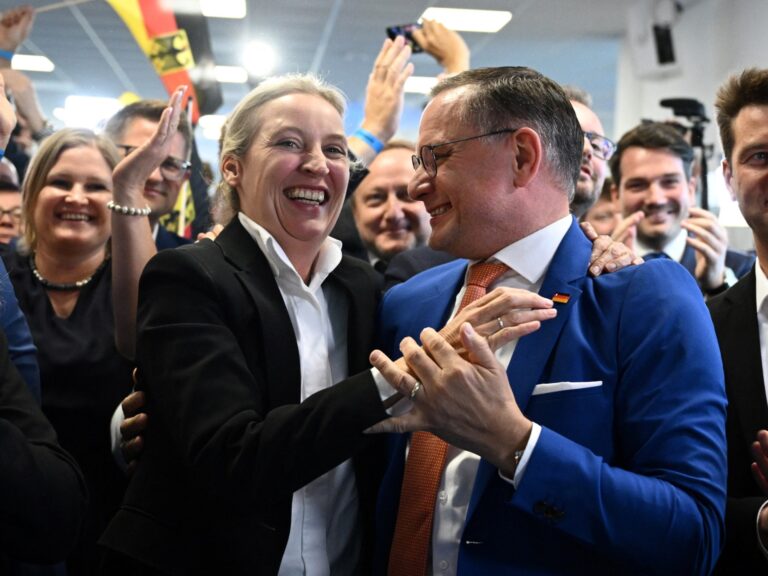Far-right parties made major gains in the European Parliamentary elections, suffering shock defeats to two of the EU’s most important leaders, German Chancellor Olaf Scholz and French President Emmanuel Macron.
In Germany, public broadcaster ARD predicted that the far-right Alternative for Germany (AfD) party would come in second in Sunday’s EU elections, highlighting the party’s strength ahead of next year’s federal elections.
According to an exit poll published by ARD, the eurosceptic party is on track to secure a record 16.5% of the vote on Sunday.
This is 5.5 percentage points higher than in the last European Union elections in 2019 and higher than the vote share of all three parties in Prime Minister Olaf Scholz’s coalition government.
At the federal level, the Conservative Party, which is in opposition, is projected to become the largest party with a slight increase to 29.5%.
Germany’s Green party suffered its biggest defeat on Sunday, falling 8.5 percentage points to 12 percent, as voters criticized the cost of its carbon-reduction policies, in line with expectations for environmental parties across Europe.
Scholz’s Social Democrats (SPD) and its third coalition partner, the pro-business Free Democrats (FDP), are also expected to struggle, with only 14% and 5% of the vote respectively, down from 15.8% and 5.4% in the last election.
The result is in line with a broader rightward shift in the European Parliament expected across the 450 million-person European Union.
The performance comes as Germany’s party landscape is undergoing its biggest upheaval in decades, with the mainstream parties that have dominated since reunification in 1990 shrinking and new populist parties vying to fill the space they have left.
Analysts say this will make it harder for incumbent parties to assemble a functioning coalition government, exacerbating the political situation. The election campaign has been marked by a surge in violence against politicians and activists.
The AfD has been plagued by scandal in recent months, with its leading candidate withdrawing from the election campaign in May after saying that members of the SS, the Nazis’ main paramilitary organisation, “were not all criminals”.
“We have fared well thanks to growing anti-European sentiment among the people,” AfD co-leader Alice Weidel said Sunday.
“People are fed up with too much bureaucracy in Brussels,” she added, citing plans to eventually ban carbon-emitting cars.
In France, Marine Le Pen’s National Rally party led the polls so overwhelmingly that President Macron immediately dissolved the National Assembly and called new elections, a major political risk that the party could suffer further defeats and jeopardize the remainder of his presidential term, which ends in 2027.
In France, Marine Le Pen’s far-right National Rally party is projected to receive around 33% support and win 31 seats in the next European Parliament, more than double the 15% that President Emmanuel Macron’s Liberal Party got.
Macron acknowledged the shock of the defeat and said: “I hear your messages, your concerns and I am not going to not respond to them,” adding that calling for early elections only underscored his own democratic credentials.
Across the EU, the mainstream, pro-European Christian Democrats and Socialists remain dominant forces. The far-right’s rise has come at the expense of the Green Party, which is expected to lose around 20 seats and fall to sixth place in parliament.
Al Jazeera’s Step Faasen reporting from Berlin said Eurosceptic parties are expected to form a major presence in the next European Parliament.
“A very large contingent of far-right parties could influence climate policy, for example… Also, [the EU’s] “Agricultural policy, and immigration policy, are very important issues here in Germany and the Netherlands,” she said.
But Vaasen pointed out that far-right parties are not united.
“They have a lot of divisions among themselves and are trying to reach out to each other. [France’s] For example, Marine Le Pen [Prime Minister] “Giorgia Meloni from Italy,” she said.
“But we’ll have to wait and see after tonight how these groups form and what influence they have.”

